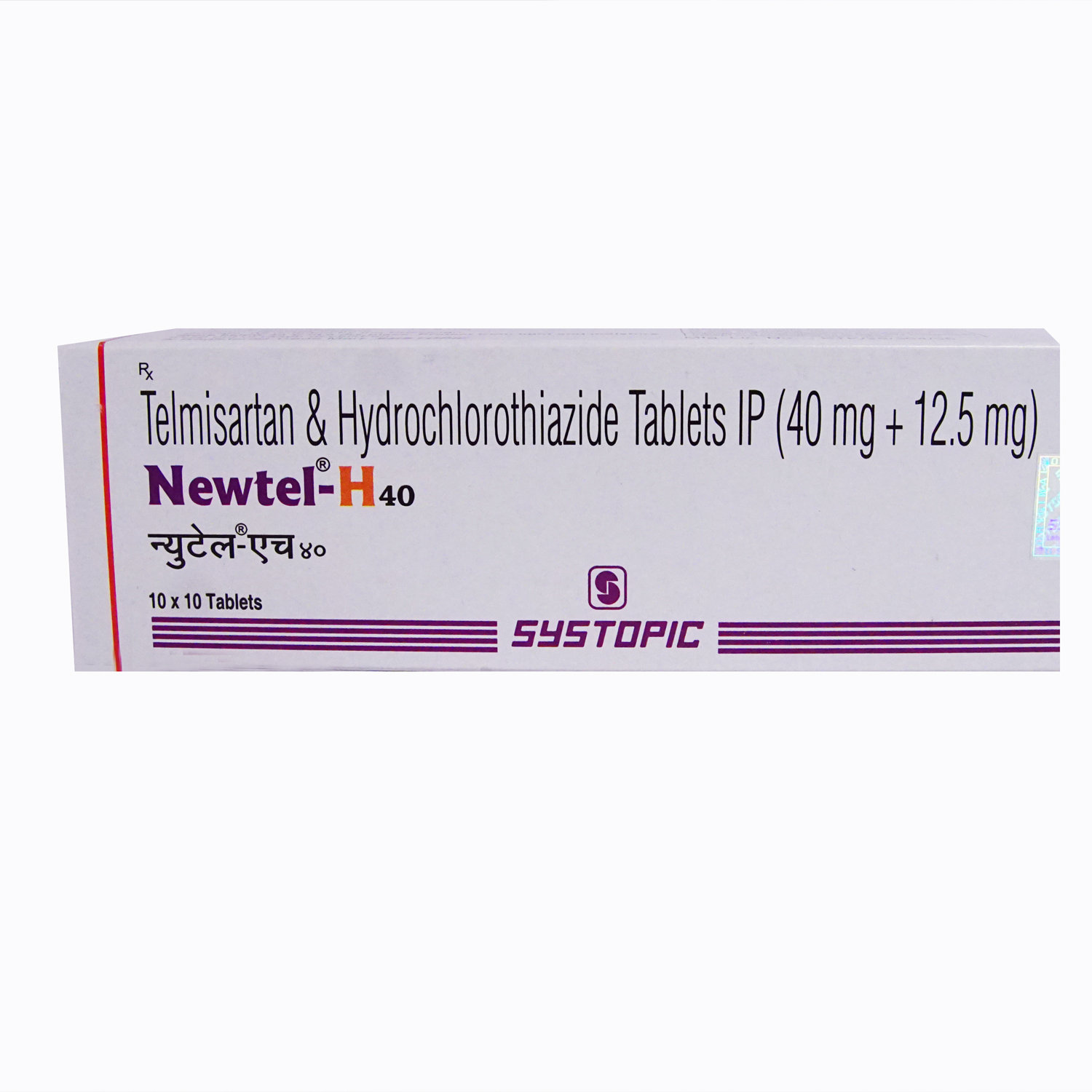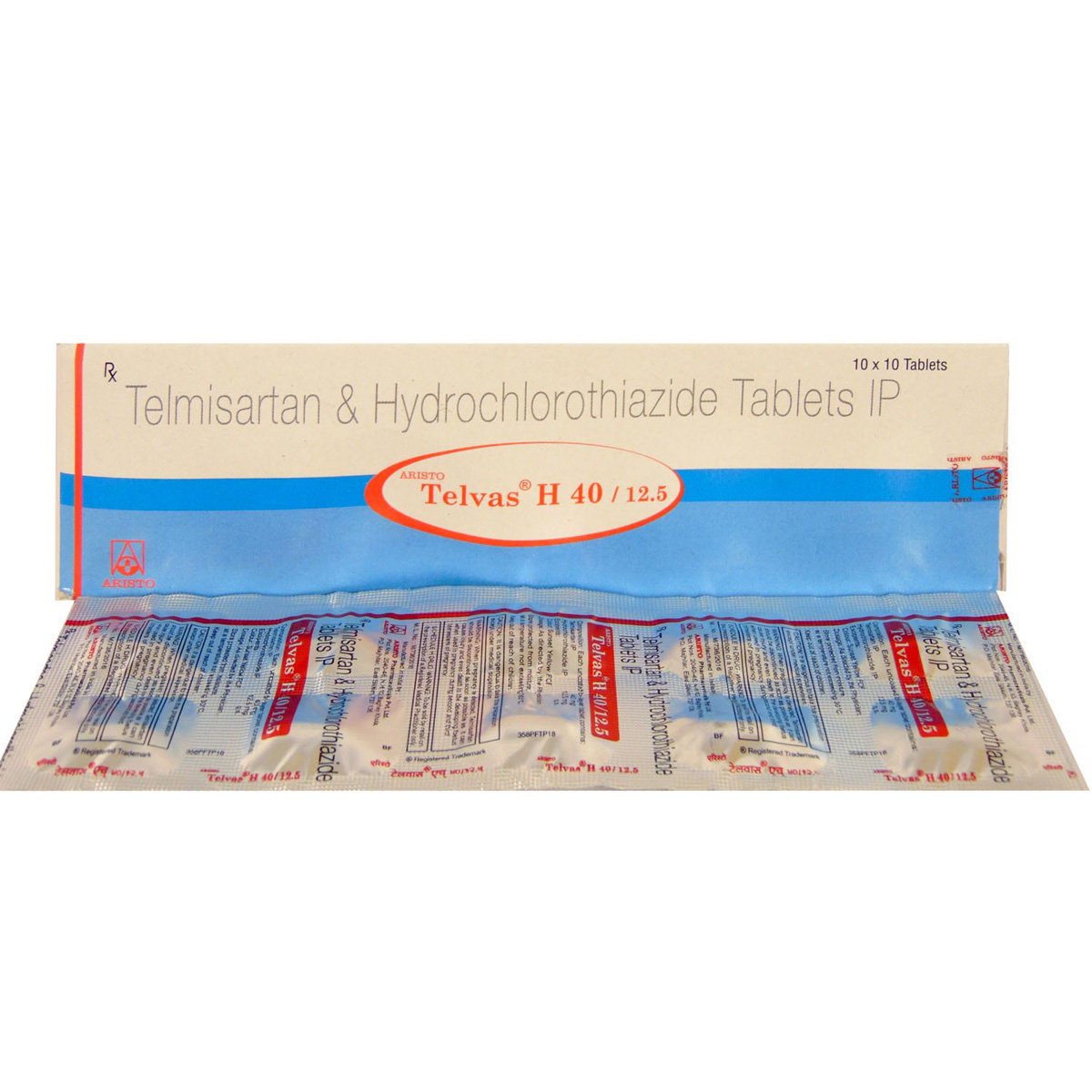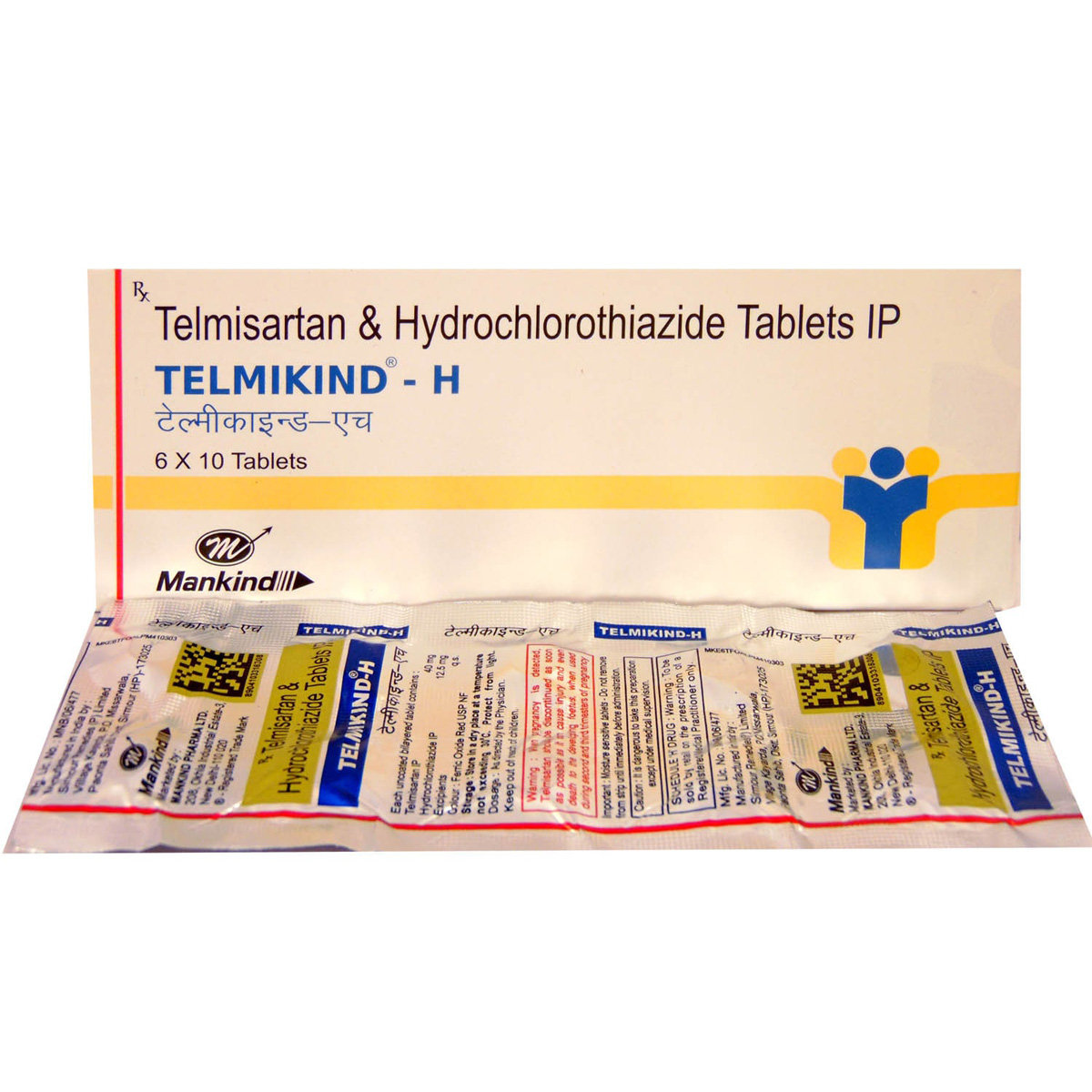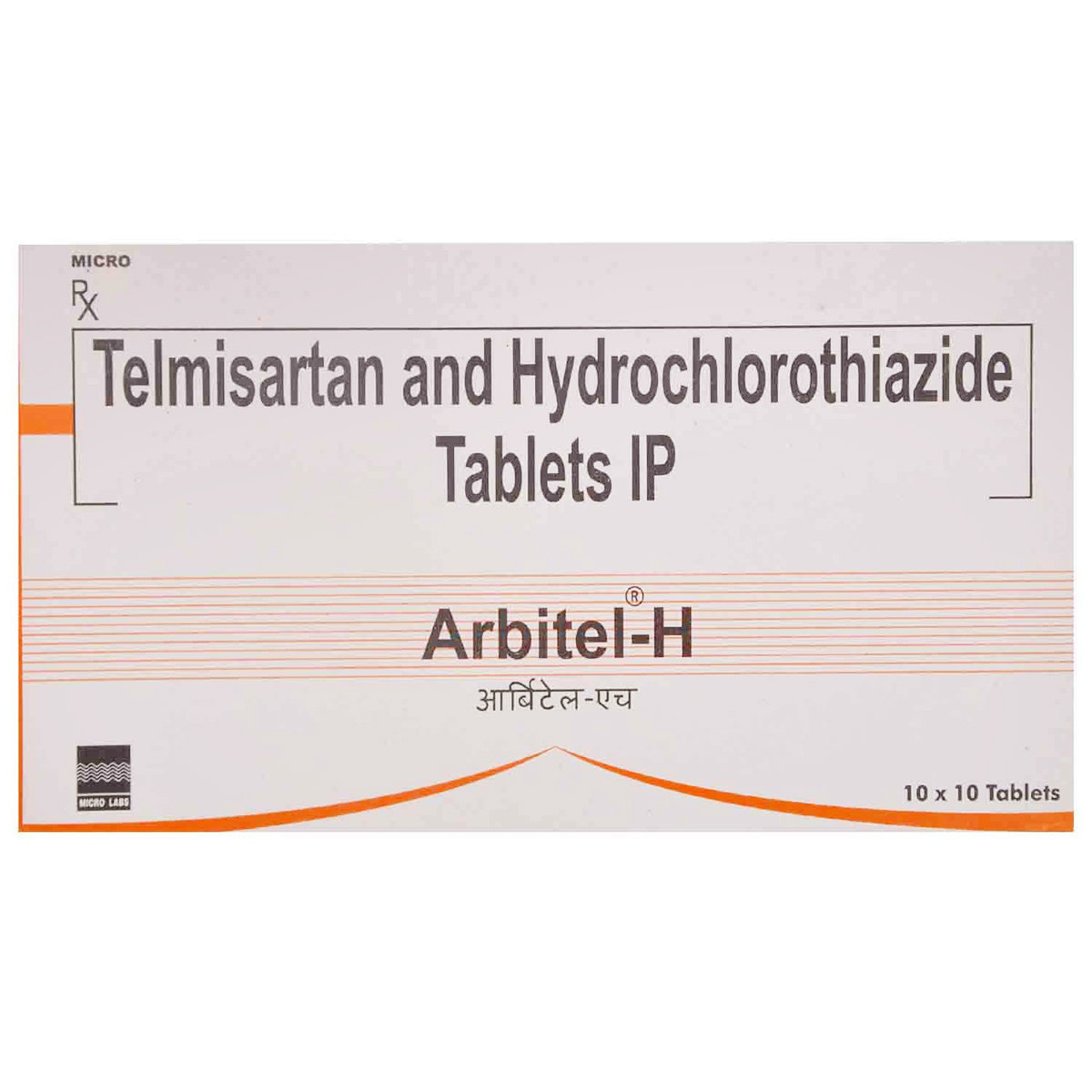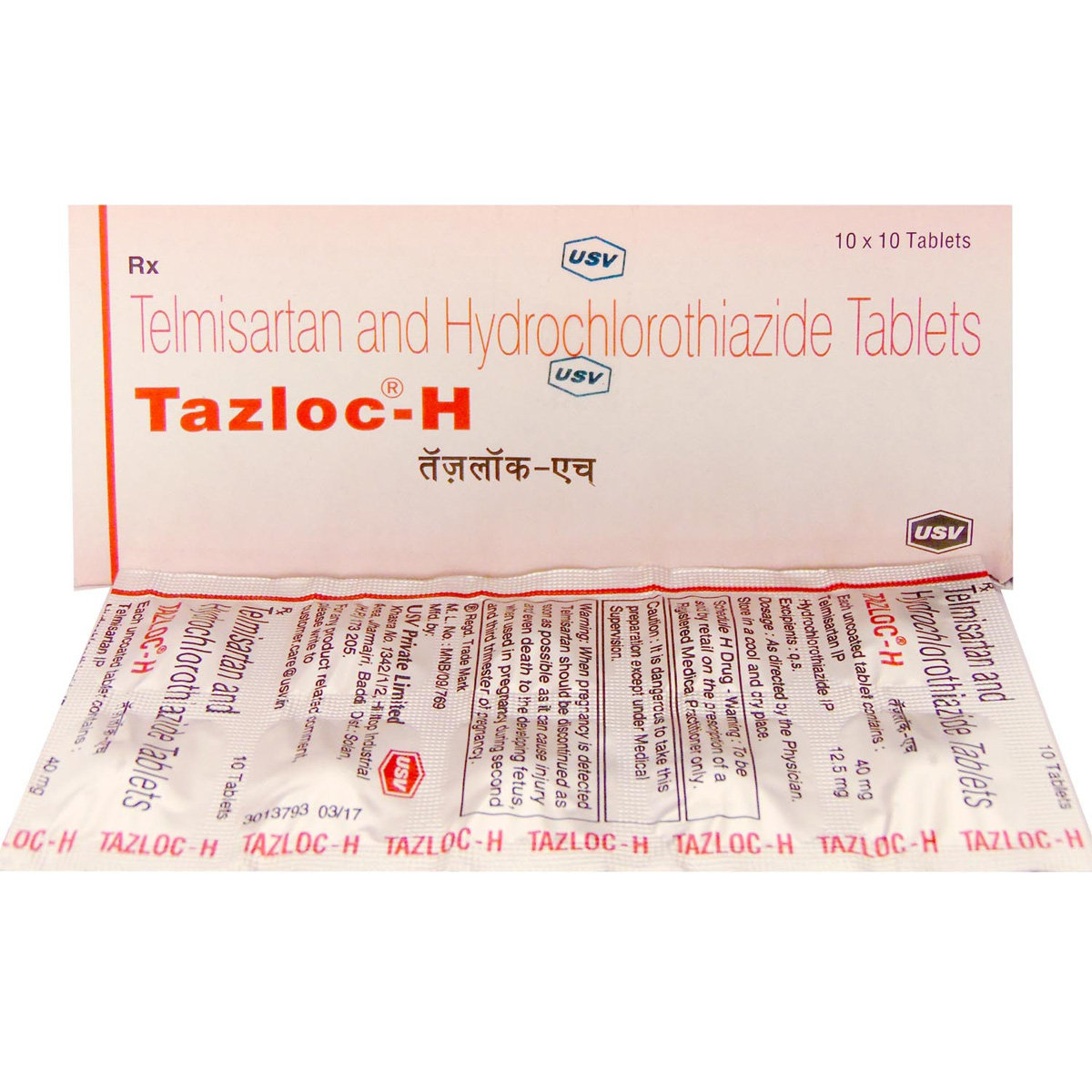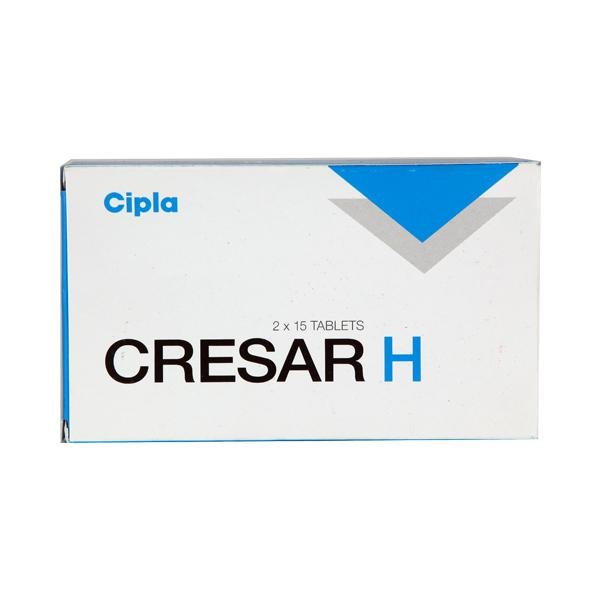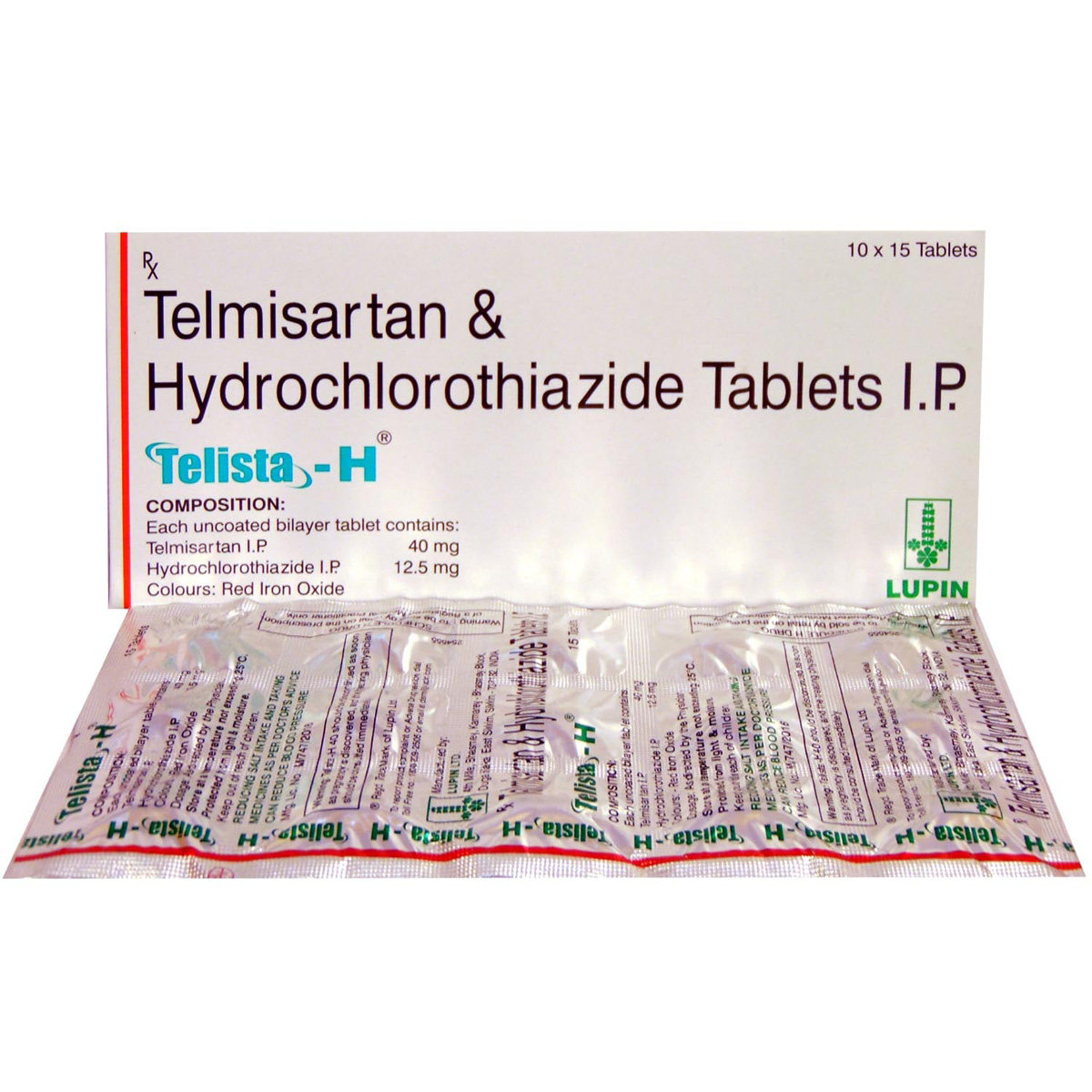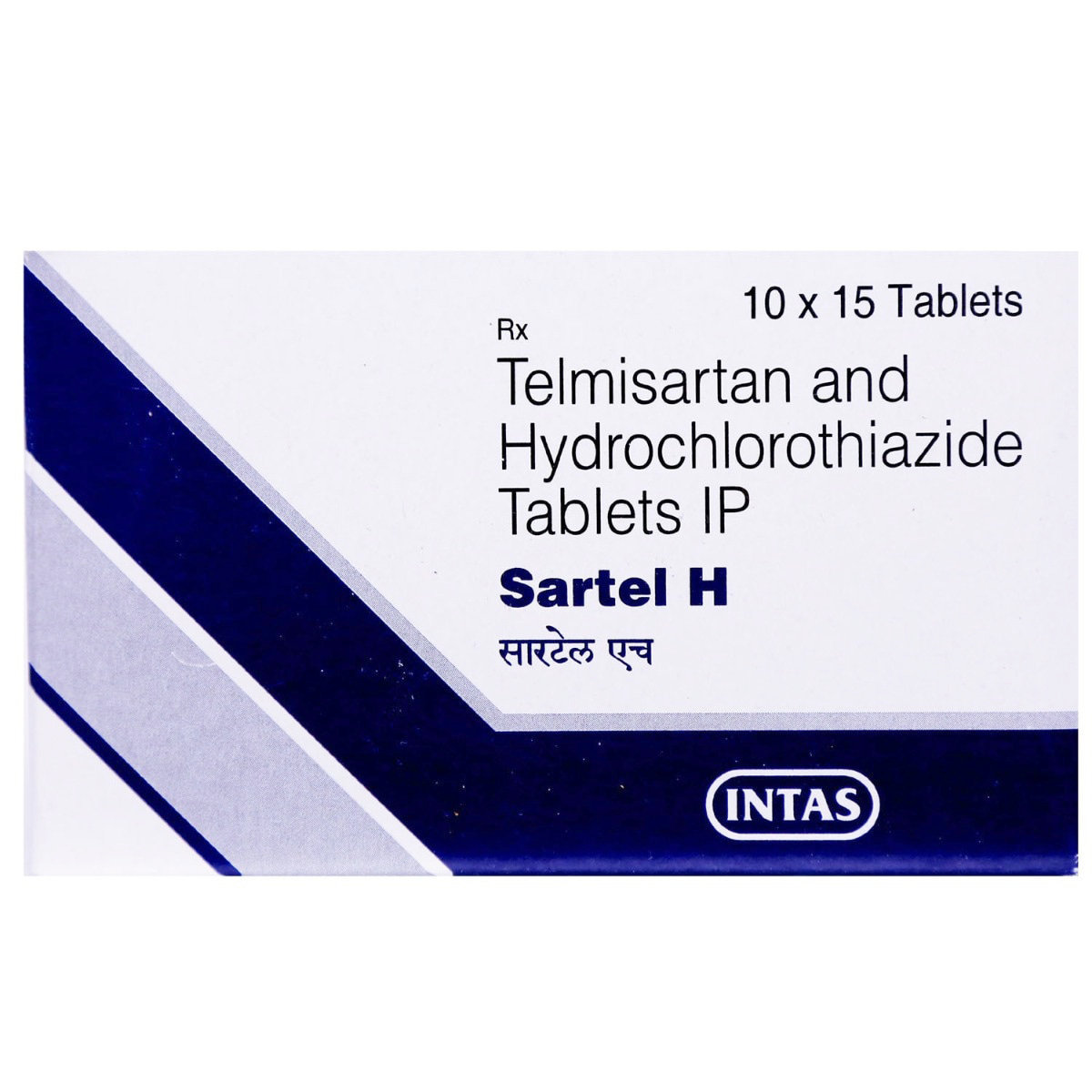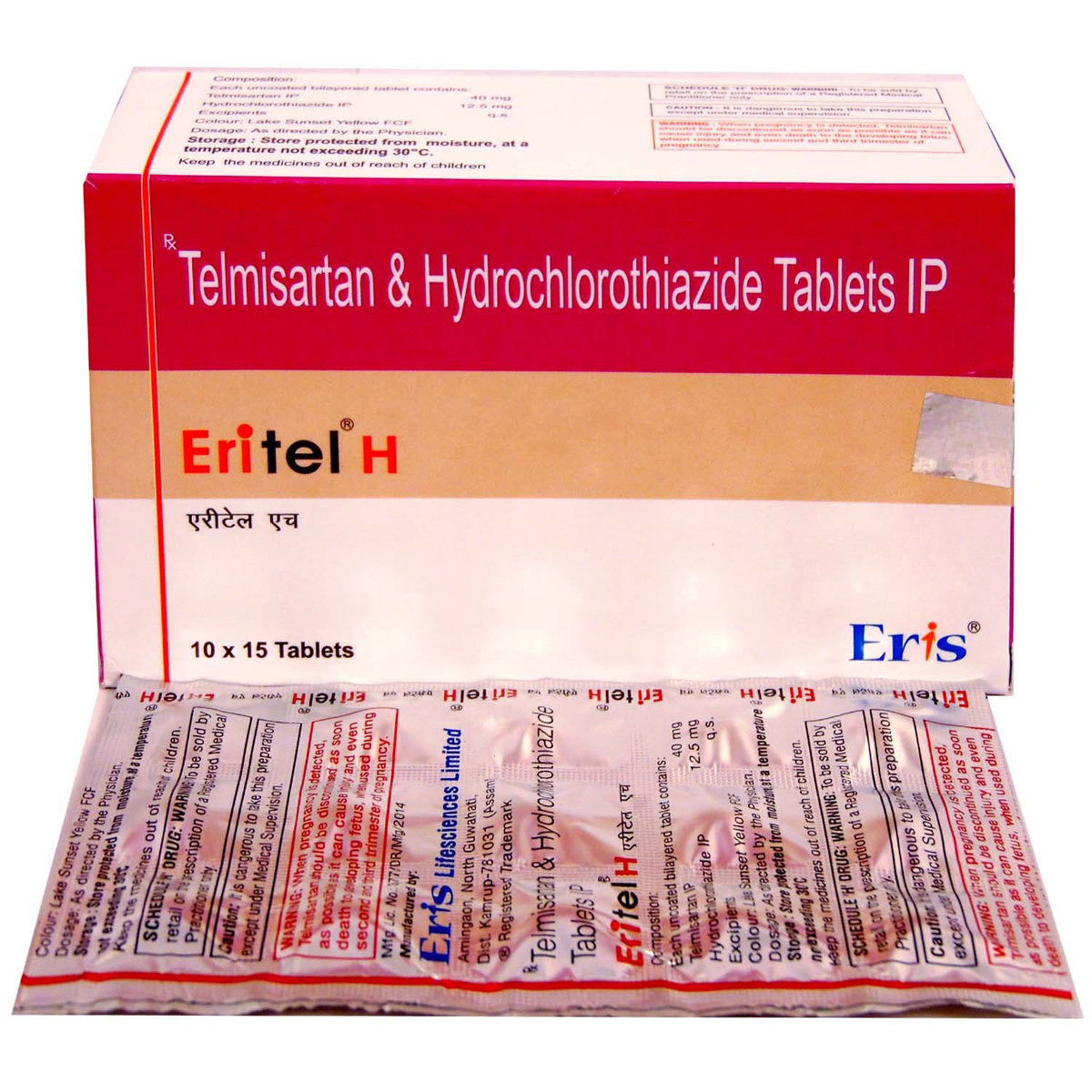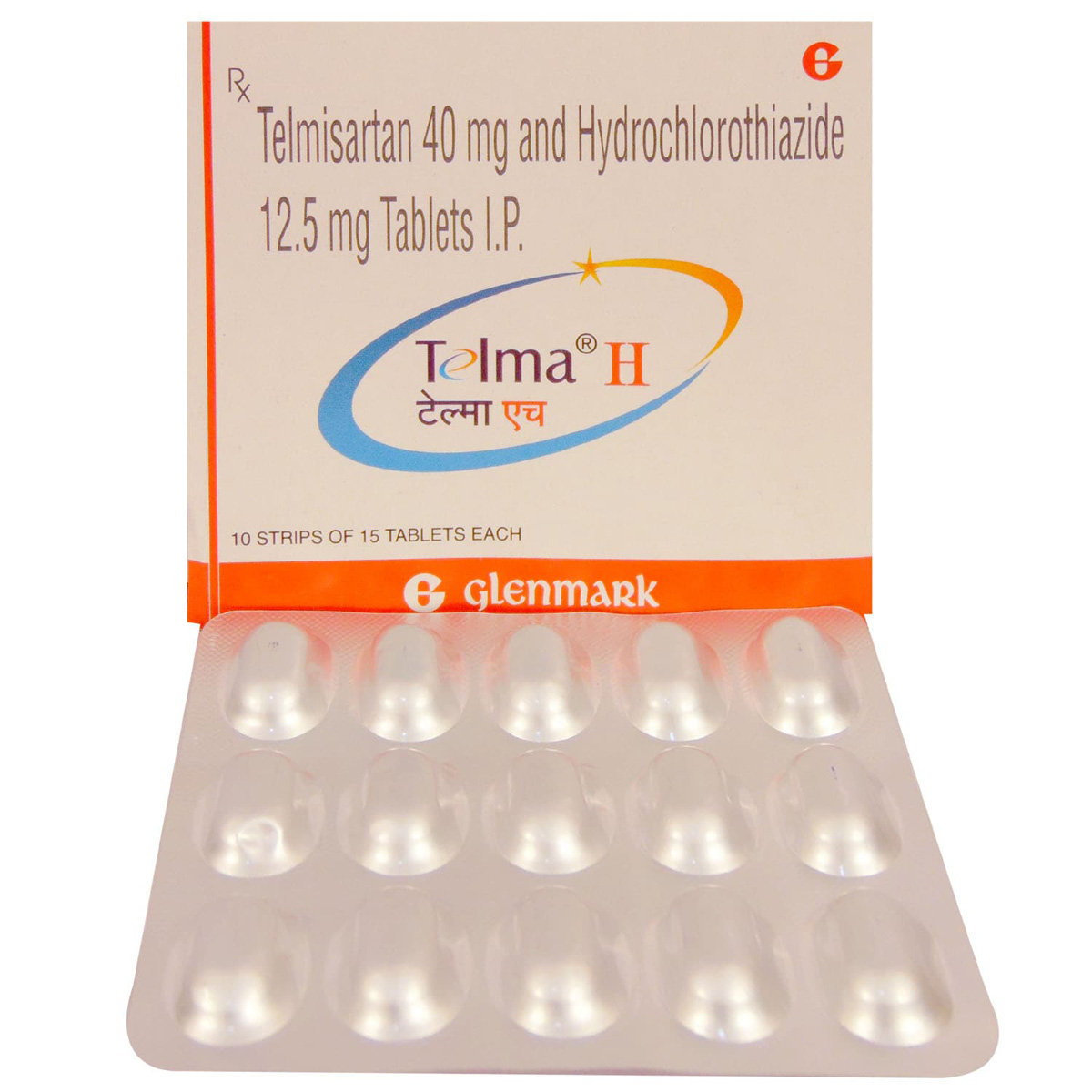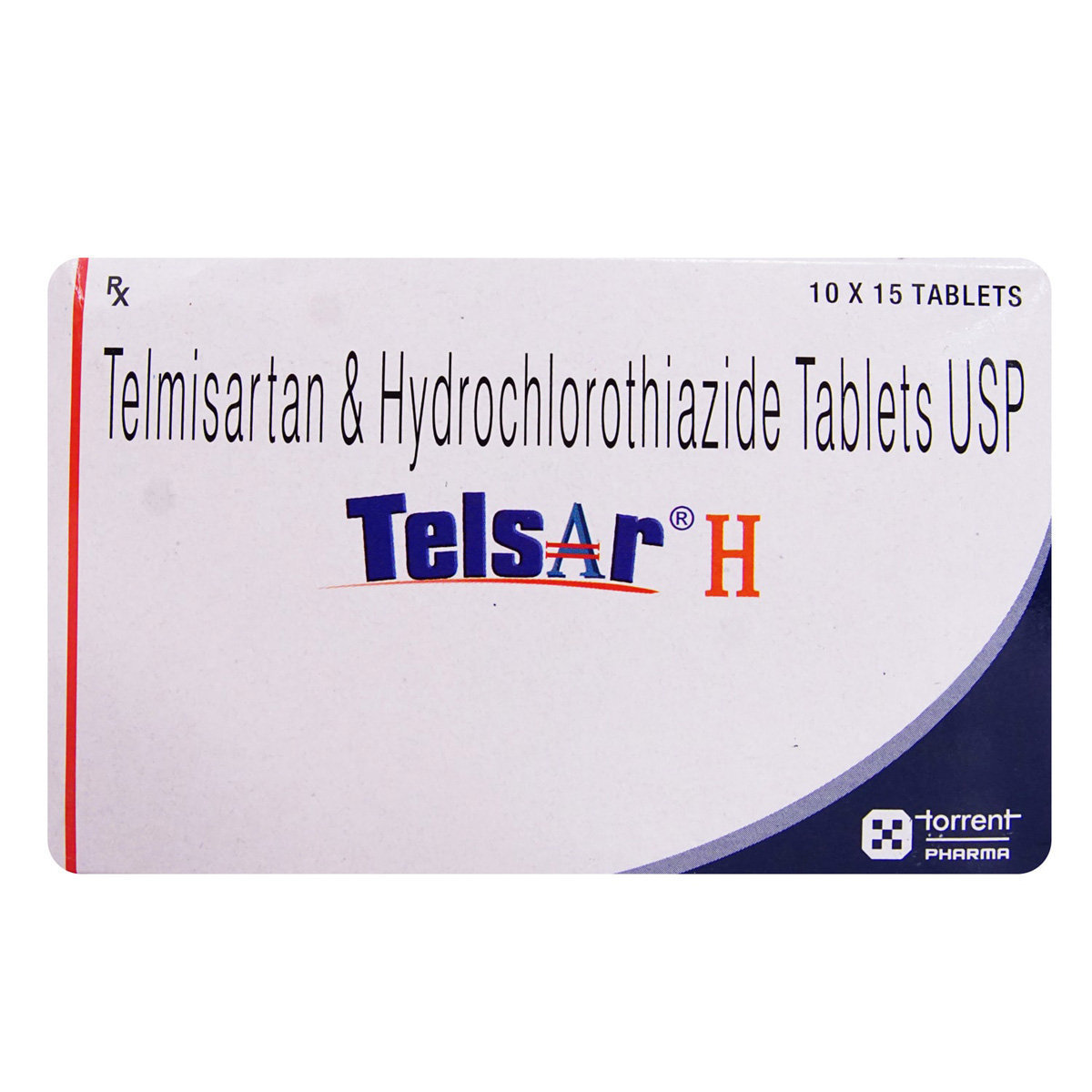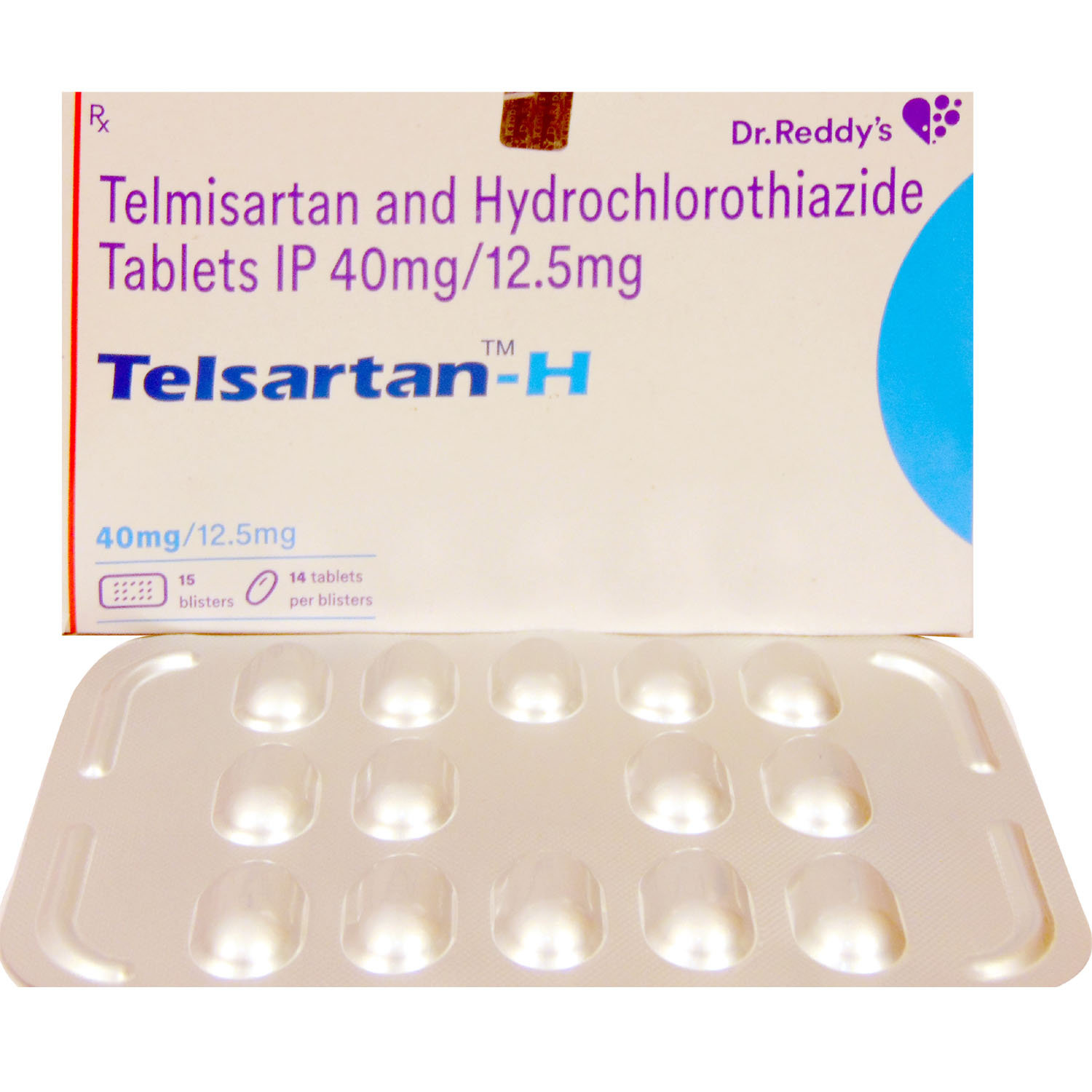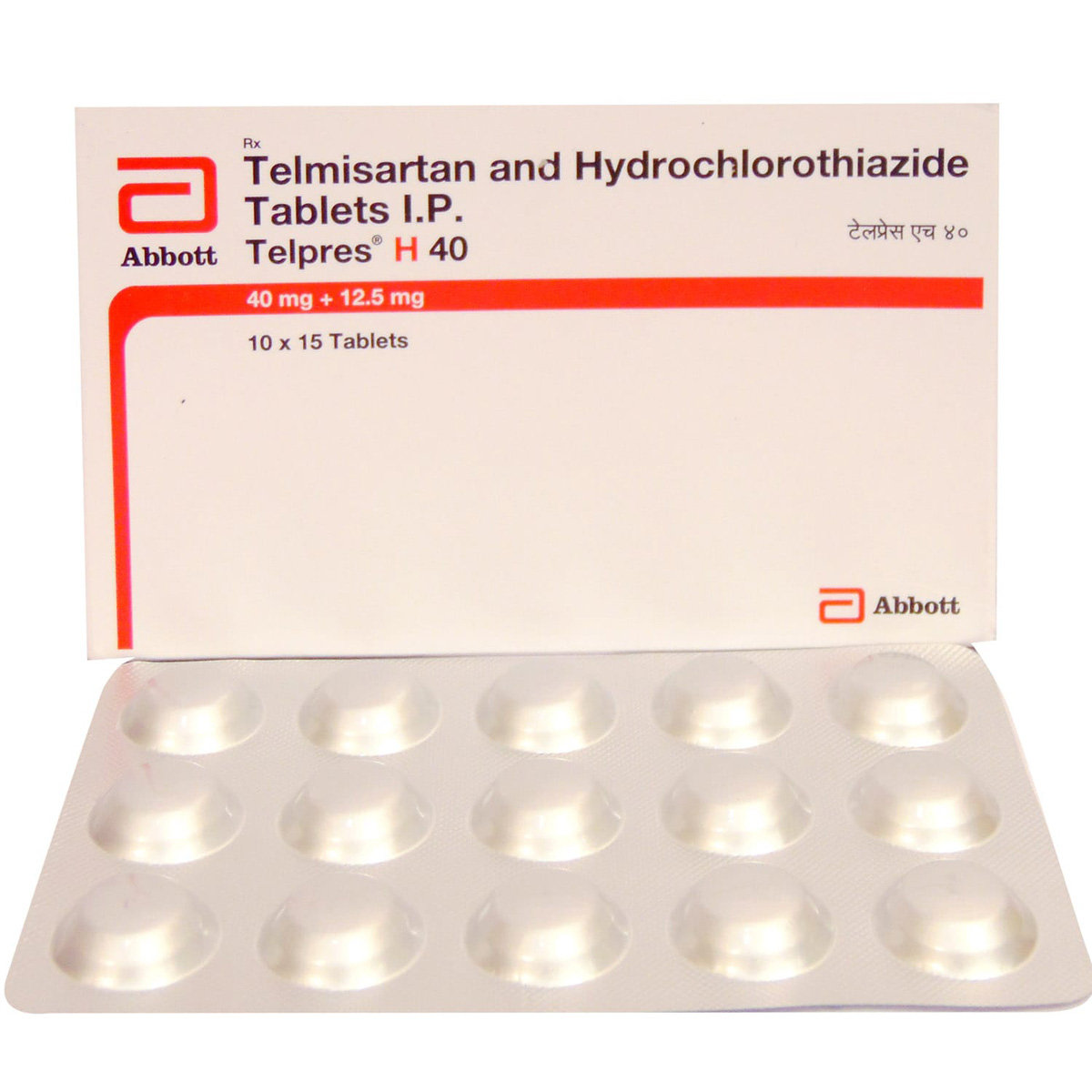Fytel 40 H Tablet 10's
MRP ₹101
(Inclusive of all Taxes)
₹15.2 Cashback (15%)
Provide Delivery Location
Online payment accepted
 Prescription drug
Prescription drugWhats That
Composition :
Manufacturer/Marketer :
Consume Type :
Expires on or after :
Return Policy :
About Fytel 40 H Tablet
Fytel 40 H Tablet belongs to the class of anti-hypertensives primarily taken for the treatment of hypertension (high blood pressure). Hypertension or high blood pressure is a life-long or chronic condition in which the force exerted by the blood against the artery wall becomes too high. It can lead to the risk of heart diseases, like heart attack and stroke.
Fytel 40 H Tablet is a combination of Telmisartan (angiotensin II receptor antagonist) and Hydrochlorothiazide (thiazide diuretic or water pill). Telmisartan is an angiotensin receptor blocker that helps to relax and widen the blood vessels (arteries). Hydrochlorothiazide is a diuretic that prevents absorption of excess salt in the body, preventing fluid retention. Together it lowers blood pressure and prevents the risk of stroke, heart attack and oedema (fluid retention).
You can take Fytel 40 H Tablet with food or empty stomach. It should be swallowed whole with a glass of water. Your doctor will advise you how often you take your tablets based on your medical condition. In some cases, you may experience dizziness, feeling tired, nausea, diarrhoea, back pain, and cold/flu symptoms. Most of these side effects of Fytel 40 H Tablet do not require medical attention and gradually resolve over time. However, if the side effects are persistent, reach out to your doctor.
Do not use potassium supplements or its salt substitutes, unless the doctor has told you. In rare cases, Fytel 40 H Tablet can cause a condition that results in the skeletal muscle problem, leading to further to kidney failure. If you notice unexplained muscle pain, dark colour urine, tenderness, or weakness, especially if you also have a fever or unexplained tiredness, immediately contact the doctor. Do not use if you are pregnant, planning to get pregnant, stop taking Fytel 40 H Tablet and tell your doctor right away. Besides this, you should not use Fytel 40 H Tablet if you are unable to urinate. If you have diabetes, do not use Fytel 40 H Tablet with any medication that contains aliskiren (a blood pressure medicine). Before taking Fytel 40 H Tablet , tell your doctor if you have ever had liver disease, kidney failure, glaucoma, high or low levels of magnesium or potassium in your blood, have allergies or asthma, lupus (an autoimmune disease), diabetes, or an allergy to penicillin or sulfa drugs.
Uses of Fytel 40 H Tablet
Directions for Use
Key Benefits
Fytel 40 H Tablet works by relaxing and widening the blood vessels (arteries) making the heart more efficient at pumping blood throughout the body. It helps to lower high blood pressure thus reduces the chances of future heart attack and stroke. Besides this, it prevents excessive water and electrolytes (like sodium, potassium etc.) from the body through urine that can raise high blood pressure.
Storage
- Inform your doctor about the symptoms you're experiencing due to medication.
- Your doctor may adjust your treatment plan, which could include changing your medication, adding new medications, or offering advice on managing your symptoms.
- Practice good hygiene, including frequent handwashing, avoiding close contact with others, and avoiding sharing utensils or personal items.
- Stay hydrated by drinking plenty of fluids to help loosen and clear mucus from your nose, throat, and airways.
- Get plenty of rest and engage in stress-reducing activities to help your body recover. If your symptoms don't subside or worsen, consult your doctor for further guidance.
- Talk to your doctor about your back pain and potential medication substitutes or dose changes.
- Try yoga or Pilates and other mild stretching exercises to increase flexibility and strengthen your back muscles.
- To lessen the tension on your back, sit and stand upright and maintain proper posture.
- To alleviate discomfort and minimize inflammation, apply heat or cold packs to the afflicted area.
- Under your doctor's supervision, think about taking over-the-counter painkillers like acetaminophen or ibuprofen.
- Make ergonomic adjustments to your workspace and daily activities to reduce strain on your back.
- To handle tension that could make back pain worse, try stress-reduction methods like deep breathing or meditation.
- Use pillows and a supportive mattress to keep your spine in the right posture as you sleep.
- Back discomfort can worsen by bending, twisting, and heavy lifting.
- Speak with a physical therapist to create a customized training regimen to increase back strength and flexibility.
- Inform Your Doctor: Notify your doctor immediately about your diarrhoea symptoms. This allows them to adjust your medication or provide guidance on managing side effects.
- Stay Hydrated: Drink plenty of fluids to replace lost water and electrolytes. Choose water, clear broth, and electrolyte-rich drinks. Avoid carbonated or caffeinated beverages to effectively rehydrate your body.
- Follow a Bland Diet: Eat easy-to-digest foods to help firm up your stool and settle your stomach. Try incorporating bananas, rice, applesauce, toast, plain crackers, and boiled vegetables into your diet.
- Avoid Trigger Foods: Steer clear of foods that can worsen diarrhoea, such as spicy, fatty, or greasy foods, high-fibre foods, and dairy products (especially if you're lactose intolerant).
- Practice Good Hygiene: Maintain good hygiene to prevent the spread of infection. To stay healthy, wash your hands frequently, clean and disinfect surfaces regularly, and avoid exchanging personal belongings with others.
- Take Anti-Diarrheal Medications: If your doctor advises, anti-diarrheal medications such as loperamide might help manage diarrhoea symptoms. Always follow your doctor's directions.
- Keep track of your diarrhoea symptoms. If they don't get better or worse or are accompanied by severe stomach pain, blood, or dehydration signs (like extreme thirst or dark urine), seek medical help.
- Report to Your Doctor: Inform your doctor about the muscle pain, as they may need to adjust your medication.
- Stretch Regularly: Gentle stretching can help relieve muscle pain and stiffness.
- Stay Hydrated: Adequate water intake supports muscle health by removing harmful substances and maintaining proper muscle function.
- Warm or Cold Compresses: Apply cold or warm compresses to the affected area to reduce pain and inflammation.
- Rest and Relaxation: Adequate rest helps alleviate muscle strain, while relaxation techniques like deep breathing and meditation can soothe muscle tightness, calm the mind, and promote relief from discomfort.
- Gentle Exercise: Participate in low-impact activities, such as yoga or short walks, to improve flexibility, reduce muscle tension, and alleviate discomfort.
- Consult a physician: If your symptoms don't improve or get worse, go to the doctor for help and guidance.
- Consult your doctor if you experience symptoms of sinusitis, such as nasal congestion, facial pain, or headaches, which may be triggered by your medication.
- Your doctor may adjust your treatment plan by changing your medication, adding new medications, or providing guidance on managing your sinusitis symptoms.
- Practice good hygiene, including frequent handwashing, avoiding close contact with others, and avoiding sharing utensils or personal items.
- If your doctor advises, you can use nasal decongestants or saline nasal sprays to help relieve nasal congestion and sinus pressure.
- To help your body recover, get plenty of rest, stay hydrated, and engage in stress-reducing activities. If your symptoms persist or worsen, consult your doctor for further guidance.
- Chest pain may last for a while and needs immediate medical attention as it is a significant health issue to be attended to.
- Take rest and refrain from doing physical activity for a while, and restart after a few days.
- Try applying an ice pack to the strained area for at least 20 minutes thrice a day. Ice pack thus helps reduce inflammation.
- Sit upright and maintain proper posture if there is persistent chest pain. • Use extra pillows to elevate your position and prop your chest up while sleeping.
- Hydrate your body: Drink enough water to prevent dehydration and headaches.
- Calm Your Mind: Deep breathing and meditation can help you relax and relieve stress.
- Rest and Recharge: Sleep for 7-8 hours to reduce headache triggers.
- Take rest: lie down in a quiet, dark environment.
- Cold or warm compresses can help reduce tension.
- Stay Upright: Maintain good posture to keep symptoms from getting worse.
- To treat headaches naturally, try acupuncture or massage therapy.
- Over-the-counter pain relievers include acetaminophen and ibuprofen.
- Prescription Assistance: Speak with your doctor about more substantial drug alternatives.
- Severe Headaches: Seek emergency medical assistance for sudden, severe headaches.
- Frequent Headaches: If you get reoccurring headaches, consult your doctor.
- Headaches with Symptoms: Seek medical attention if your headaches include fever, disorientation, or weakness.
Drug Warnings
Fytel 40 H Tablet should not be given to the people allergic to Fytel 40 H Tablet , have low blood pressure (less than 90 mm of Hg), have had a heart attack, kidney disease, liver disease, pregnant women, or planning to get pregnant and breastfeeding women. It should be used with caution in patients suffering from diabetes. Besides this, it is contraindicated in low blood pressure (hypotension), cardiogenic shock (sudden stopping of blood flow to the heart), and aortic stenosis (heart valve problem). Fytel 40 H Tablet can pass into breast milk, but its effect on the baby is not known. So, it is better to tell your doctor if you are taking Fytel 40 H Tablet and breastfeeding.
Drug-Drug Interactions
Drug-Drug Interactions
Login/Sign Up
Co-administration of Aliskiren with Fytel 40 H Tablet can increase the risk of hyperkalemia (high potassium levels in the blood).
How to manage the interaction:
Taking Fytel 40 H Tablet with Aliskiren can possibly lead to an interaction, please consult a doctor before taking it. Do not discontinue the medications without consulting a doctor.
Taking Cisapride and Fytel 40 H Tablet can increase the risk of an irregular heart rhythm which can be severe. The risk increases in patients with a history of heart illness or electrolyte imbalance.
How to manage the interaction:
Combining Cisapride and Fytel 40 H Tablet together is generally avoided as it can possibly result in an interaction, it can be taken if advised by your doctor. However, if you experience any symptoms like dizziness, lightheadedness, fainting, or fast or pounding heartbeats, consult the doctor immediately. Do not stop using any medications without a doctor's advice.
Taking Dofetilide and Fytel 40 H Tablet can increase the risk of an irregular heart rhythm which can be severe. The risk increases in patients with a history of heart illness or electrolyte imbalance.
How to manage the interaction:
Combining Dofetilide and Fytel 40 H Tablet together is not recommended as it can possibly result in an interaction, it can be taken if advised by your doctor. However, if you experience any symptoms like sudden dizziness, lightheadedness, fainting, shortness of breath, chest pain or tightness, rapid heartbeat, or memory loss, contact your doctor immediately. Do not discontinue any medications without consulting a doctor.
Co-administration of Fytel 40 H Tablet may significantly increase the blood levels of lithium.
How to manage the interaction:
Although there is a possible interaction, Fytel 40 H Tablet can be taken with lithium if prescribed by the doctor. Consult the prescriber if you experience symptoms of lithium intoxication such as drowsiness, dizziness, confusion, loose stools, vomiting, muscle weakness, muscle incoordination, shaking of hands and legs, blurred vision, ringing in the ear, excessive thirst, or increased urination. Do not discontinue the medication without consulting a doctor.
Co-administration of Potassium acetate can make Fytel 40 H Tablet more likely to cause high levels of potassium in the blood.
How to manage the interaction:
Although taking Potassium acetate and Fytel 40 H Tablet together can evidently cause an interaction, it can be taken if your doctor has suggested it. Do not stop using any medications without a doctor's advice.
Taking ramipril with Fytel 40 H Tablet may increase the risk of side effects such as low blood pressure, kidney function impairment, and high blood potassium.
How to manage the interaction:
Although there is a possible interaction, Fytel 40 H Tablet can be taken with ramipril if prescribed by the doctor. Consult the prescriber if you experience symptoms of high potassium such as nausea, vomiting, weakness, confusion, tingling of the hands and feet, feelings of heaviness in the legs, a weak pulse, or a slow or irregular heartbeat. Maintain adequate fluid intake during treatment with these medications. Do not discontinue the medications without consulting a doctor.
Taking Potassium citrate with Fytel 40 H Tablet together may increase potassium levels in the blood, which can lead to kidney failure, muscular paralysis, and abnormal heart rhythm.
How to manage the interaction:
Although taking Potassium citrate with Fytel 40 H Tablet together can possibly result in an interaction, it can be taken if a doctor has advised it. However, consult the doctor if you experience nausea, vomiting, weakness, disorientation, tingling in your hands and feet, feelings of heaviness in your legs, a weak pulse, or a slow or irregular heartbeat. It is essential to maintain proper fluid intake while taking these medications. It is advised to reduce the intake of potassium-rich foods. Do not discontinue any medications without a doctor's advice.
Taking Potassium Iodide with Fytel 40 H Tablet can make high levels of potassium in the blood more likely.
How to manage the interaction:
Although taking Potassium iodide and Fytel 40 H Tablet together can evidently cause an interaction, it can be taken if your doctor has suggested it. Do not stop using any medications without a doctor's advice.
Taking lisinopril with Fytel 40 H Tablet may increase the levels of potassium in blood.
How to manage the interaction:
Although there is a possible interaction, Fytel 40 H Tablet can be taken with lisinopril if prescribed by the doctor. Consult the prescriber if you experience symptoms of high potassium such as nausea, vomiting, weakness, confusion, tingling of the hands and feet, feelings of heaviness in the legs, a weak pulse, or a slow or irregular heartbeat. Maintain adequate fluid intake during treatment with these medications.
Taking spironolactone with Fytel 40 H Tablet may increase potassium levels in the blood.
How to manage the interaction:
Although there is a possible interaction, Fytel 40 H Tablet can be taken with spironolactone if prescribed by the doctor. Consult the prescriber if you experience symptoms of high potassium such as nausea, vomiting, weakness, confusion, tingling of the hands and feet, feelings of heaviness in the legs, a weak pulse, or a slow or irregular heartbeat. Maintain adequate fluid intake during treatment with these medications. Do not discontinue the medications without consulting a doctor.
Drug-Food Interactions
Drug-Food Interactions
Login/Sign Up
Lentils, Orange Juice, Oranges, Raisins, Potatoes, Salmon Dried, Spinach, Sweet Potatoes, Tomatoes, Coconut Water, Beans, Beetroot, Broccoli, Bananas, Apricots, Avocado, Yogurt
How to manage the interaction:
Consumption of Fytel 40 H Tablet with potassium-containing salt substitutes may increase the levels of potassium in the body. Avoid potassium-containing salt substitutes while being treated with Fytel 40 H Tablet. Consult a doctor if you experience weakness, irregular heartbeat, confusion, tingling of the extremities, or feelings of heaviness in the legs.
Diet & Lifestyle Advise
- Keep your weight under control with BMI 19.5-24.9.
- Do regular physical activity or exercise for at least 150 minutes per week, or about 30 minutes most days of the week. Doing this can help you to lower your raised blood pressure by about 5 mm of Hg.
- Limit intake of sodium chloride (table salt) in your daily diet to 2300 mg per day or less than 1500 mg is ideal for most adults.
- If you are taking alcohol then only one serving for women and two servings for men is advisable.
- Quitting smoking is the best strategy to lower the risk of heart disease.
- Avoid chronic stress as it can raise your blood pressure. Try to enjoy and spent time with your loved ones to cope with stress and practice mindfulness techniques.
- Monitor your blood pressure daily and if there is too much fluctuation then immediately contact your doctor.
- Try to include heart-healthy omega 3 fatty acids containing food drinks in your daily diet. You can also use low-fat cooking oil like olive oil, soybean oil, canola oil, and coconut oil can help in lowering your elevated blood pressure.
Side Effects of Fytel 40 H Tablet
- Dizziness
- Feeling tired
- Nausea
- Diarrhoea
- Back pain
- Cold/flu symptoms
Habit Forming
Therapeutic Class
All Substitutes & Brand Comparisons
RX
Newtel H 40 Tablet 10's
Systopic Laboratories Pvt Ltd
₹47.5
(₹4.28 per unit)
52% CHEAPERRX
Telvas H 40/12.5 Tablet 10's
Aristo Pharmaceuticals Pvt Ltd
₹86
(₹7.74 per unit)
14% CHEAPERRX
Telmikind-H Tablet 10's
Mankind Pharma Pvt Ltd
₹93
(₹8.37 per unit)
7% CHEAPER
Drug-Diseases Interactions
Drug-Diseases Interactions
Login/Sign Up
FAQs
Drug-Drug Interactions Checker List
- LITHIUM
- DIGOXIN
- METFORMIN
- INSULIN HUMAN
- SILDENAFIL
- SIMVASTATIN
- ENALAPRIL
- LISINOPRIL
- RAMIPRIL
Disease/Condition Glossary
Hypertension: It is a chronic condition when blood pressure is too high. This condition can lead to hardened arteries (blood vessels), decreasing the blood and oxygen flow to the heart. Blood pressure is the measurement of the force that our heart uses to pump blood to all parts of the body. Raised blood pressure can cause chest pain (angina) and heart attack (when blood supply to the heart is blocked). Additionally, high blood pressure also causes brain damage (stroke) and kidney failure. High blood pressure can be diagnosed with the help of a blood pressure monitor or sphygmomanometer. Systolic pressure is the pressure when the heart pumps blood out. On the other hand, diastolic pressure is the pressure when your heart is at the resting stage between heartbeats. If your blood pressure is 140/90 mm of Hg, it means the systolic pressure is 140 mm of Hg and, diastolic pressure is 90 mm of Hg. Ideal blood pressure should be between 90/60 mm of Hg and 120/80 mm of Hg.

Have a query?
Alcohol
Safe if prescribed
You are recommended not to consume alcohol along with Fytel 40 H Tablet to avoid unpleasant side effects like drowsiness, dizziness and liver damage.
Pregnancy
Consult your doctor
Fytel 40 H Tablet is not recommended during pregnancy. This medicine may cause fetal damage and can affect the unborn baby (foetus).
Breast Feeding
Consult your doctor
Fytel 40 H Tablet is known to pass breast milk, but, its effect on the baby is not known. So, before breastfeeding, let your doctor know about this.
Driving
Safe if prescribed
Drive with caution, Fytel 40 H Tablet usually causes drowsiness and affects driving ability.
Liver
Consult your doctor
Fytel 40 H Tablet to be taken with caution, especially if you have or have had a history of liver disease. Your doctor will have to change the dosage depending on your medical condition and your reaction to treatment.
Kidney
Consult your doctor
Not recommended in patients with chronic kidney disease (severe renal impairment). Safety and effectiveness in patients with severe renal impairment have not been established.
Children
Safe if prescribed
Fytel 40 H Tablet can be given safely to children aged 6 - 12 years provided; dose has been prescribed by a child specialist.




